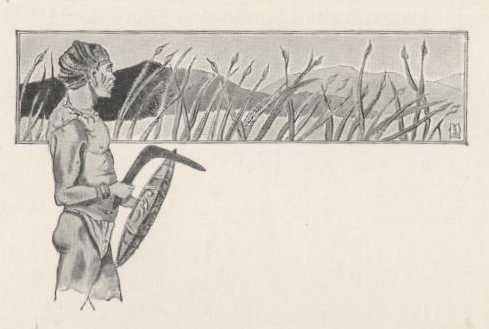We started at 4.20 in the afternoon, and moved across level plains until night. In the morning we had a stretch of "scrub" country—the kind of thing which is so useful to the Australian novelist. In the scrub the hostile aboriginal lurks, and flits mysteriously about, slipping out from time to time to surprise and slaughter the settler; then slipping back again, and leaving no track that the white man can follow. In the scrub the novelist's heroine gets lost, search fails of result; she wanders here and there, and finally sinks down exhausted and unconscious, and the searchers pass within a yard or two of her, not suspecting that she is near, and by and by some rambler finds her bones and the pathetic diary which she had scribbled with her failing hand and left behind. Nobody can find a lost heroine in the scrub but the aboriginal "tracker," and he will not lend himself to the scheme if it will interfere with the novelist's plot. The scrub stretches miles and miles in all directions, and looks like a level roof of bush-tops without a break or a crack in it—as seamless as a blanket, to all appearance. One might as well walk under water and hope to guess out a route and stick to it, I should think. Yet it is claimed that the aboriginal "tracker" was able to hunt out people lost in the scrub. Also in the "bush"; also in the desert; and even follow them over patches of bare rocks and over alluvial ground which had to all appearance been washed clear of footprints.

From reading Australian books and talking with the people, I became convinced that the aboriginal tracker's performances evince a craft, a penetration, a luminous sagacity, and a minuteness and accuracy of observation in the matter of detective-work not found in nearly so remarkable a degree in any other people, white or colored. In an official account of the blacks of Australia published by the government of Victoria, one reads that the aboriginal not only notices the faint marks left on the bark of a tree by the claws of a climbing opossum, but knows in some way or other whether the marks were made to-day or yesterday.
And there is the case, on record where A., a settler, makes a bet with B., that B. may lose a cow as effectually as he can, and A. will produce an aboriginal who will find her. B. selects a cow and lets the tracker see the cow's footprint, then be put under guard. B. then drives the cow a few miles over a course which drifts in all directions, and frequently doubles back upon itself; and he selects difficult ground all the time, and once or twice even drives the cow through herds of other cows, and mingles her tracks in the wide confusion of theirs. He finally brings his cow home; the aboriginal is set at liberty, and at once moves around in a great circle, examining all cow-tracks until he finds the one he is after; then sets off and follows it throughout its erratic course, and ultimately tracks it to the stable where B. has hidden the cow. Now wherein does one cow-track differ from another? There must be a difference, or the tracker could not have performed the feat; a difference minute, shadowy, and not detectible by you or me, or by the late Sherlock Holmes, and yet discernible by a member of a race charged by some people with occupying the bottom place in the gradations of human intelligence.